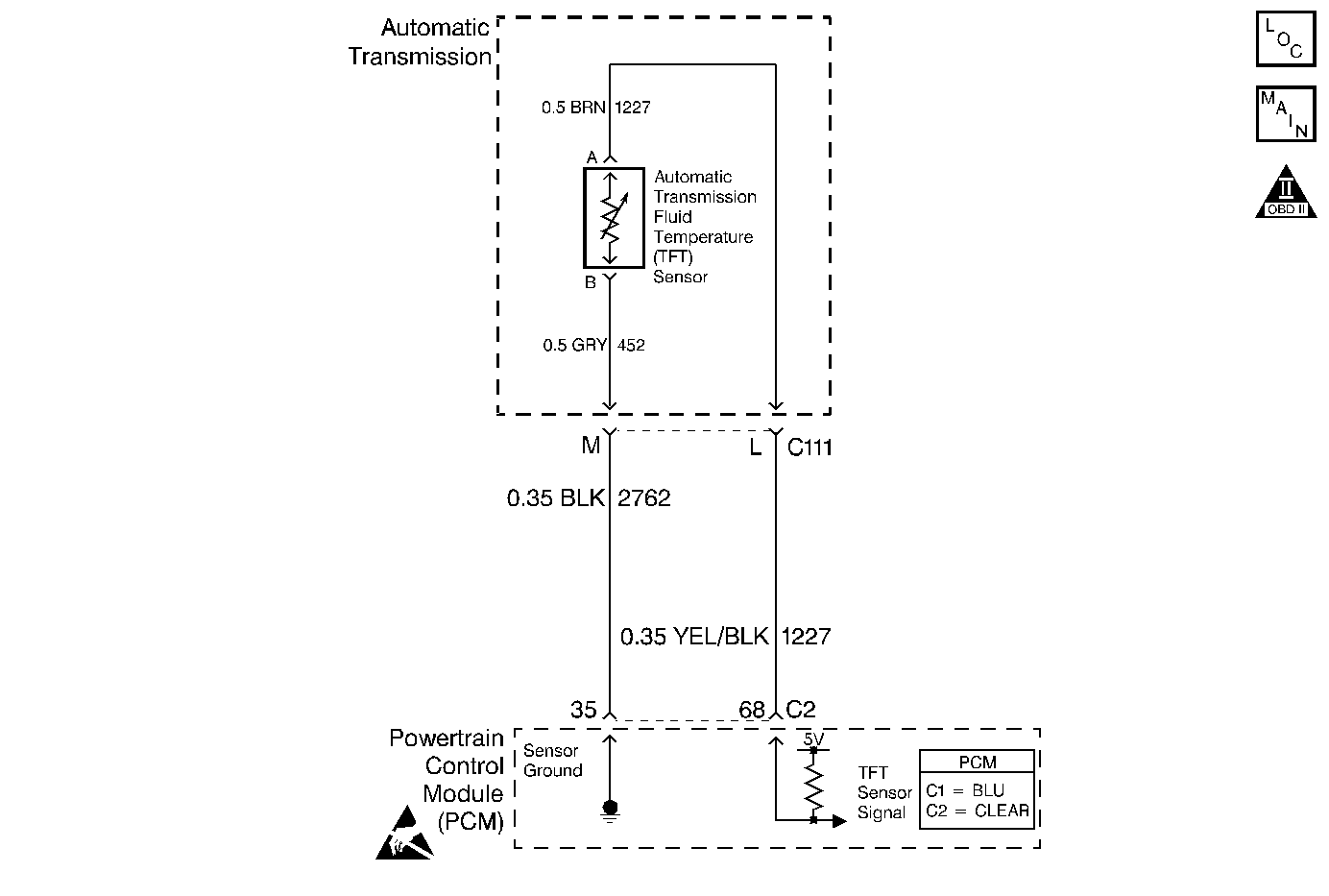
Circuit Description
The automatic transmission fluid temperature (TFT) sensor is a negative coefficient thermistor whose resistance value changes based on temperature. The PCM provides a 5 volt reference to the sensor on circuit 1227. A low fluid temperature, an open TFT sensor or open circuits 1227 or 2762/452 results in high signal voltage. The TFT operating range is -40 to +151°C (-40 to +304°F).
If the PCM detects a continuous open or a short to power on the TFT sensor circuit, then DTC P0713 sets. DTC P0713 is a Type D DTC.
Conditions for Running the DTC
The system voltage is 9-18 volts.
Conditions for Setting the DTC
The PCM detects a TFT sensor voltage greater than 4.92 volts for 6 minutes and 40 seconds continuous.
Action Taken When the DTC Sets
| • | The PCM does not turn on the malfunction indicator lamp (MIL). |
| • | The PCM freezes shift adapts. |
| • | The PCM calculates a default TFT from the ECT sensor and the IAT sensor. |
| • | The PCM stores DTC P0713 in PCM history. |
Conditions for Clearing the DTC
| • | A scan tool clears the DTC from PCM history. |
| • | The PCM clears the DTC from PCM history if the vehicle completes 40 consecutive warm-up cycles without a non-emission-related diagnostic fault occurring. |
| • | The PCM cancels the DTC default actions when the fault no longer exists and the ignition switch is OFF long enough in order to power down the PCM. |
Diagnostic Aids
| • | Inspect the wiring at the PCM, the transmission 20-way connector and all other circuit connecting points for the following conditions: |
| - | A backed out terminal |
| - | A damaged terminal |
| - | Reduced terminal tension |
| - | A chafed wire |
| - | A broken wire inside the insulation |
| - | Moisture intrusion |
| - | Corrosion |
| • | When diagnosing for an intermittent open, massage the wiring harness while watching the test equipment for a change. |
| • | Test the TFT sensor at various temperature levels to evaluate the possibility of a skewed (mis-scaled) sensor. Refer to the Temperature vs Resistance table. |
Test Description
The numbers below refer to the step numbers on the diagnostic table.
-
If the display does not indicate a TFT sensor voltage greater than 4.92 volts, inspect the connector and the terminals for intermittent conditions.
-
Important: After 10 seconds, the scan tool will display a default temperature.
This step tests the integrity of the engine harness and the PCM by using a fused jumper wire from terminal L to terminal M. Voltage should be less than 0.2 volts.
-
Because of the harsh conditions inside the transmission, repairing the automatic transmission (A/T) wiring harness assembly is not acceptable. It must be replaced if it is damaged in any way.
Step | Action | Value(s) | Yes | No |
|---|---|---|---|---|
1 | Was the Powertrain On-Board Diagnostic (OBD) System Check performed? | -- | Go to Powertrain On Board Diagnostic (OBD) System Check in Engine Controls | |
2 | Was the transmission fluid checking procedure performed? | -- | Go to Transmission Fluid Check | |
Important: Before clearing the DTCs, use the scan tool in order to record the Failure Records for reference. Using the Clear Info function will erase the stored Failure Records from the PCM. Does the scan tool display a TFT sensor voltage greater than the specified value? | 4.92 volts | Go to Diagnostic Aids | ||
Refer to Automatic Transmission Inline Harness Connector End View . Important: Additional DTCs will set. Does the scan tool display a TFT sensor voltage greater than the specified value? | 4.92 volts | |||
5 | Inspect circuit 1227 (YEL/BLK) of the engine wiring harness for an open. Refer to General Electrical Diagnosis in Wiring Systems. Was a condition found? | -- | ||
6 | Inspect circuit 2762 (BLK) of the engine wiring harness for an open. Refer to General Electrical Diagnosis in Wiring Systems. Was a condition found? | -- | ||
7 |
Refer to General Electrical Diagnosis in Wiring Systems. Was a condition found? | -- | ||
8 | Repair the circuit as necessary. Refer to Wiring Repairs in Wiring Systems. Is the repair complete? | -- | -- | |
9 | Replace the automatic transmission fluid temperature sensor. Refer to Fluid Temperature Sensor Replacement . Is the replacement complete? | -- | -- | |
Replace the automatic transmission wiring harness assembly. Refer to Solenoids and Wiring Harness Replacement . Is the replacement complete? | -- | -- | ||
11 | Replace the PCM. Refer to Powertrain Control Module Replacement/Programming in Engine Controls. Is the replacement complete? | -- | -- | |
12 | Perform the following procedure in order to verify the repair:
Has the test run and passed? | -- | System OK |
